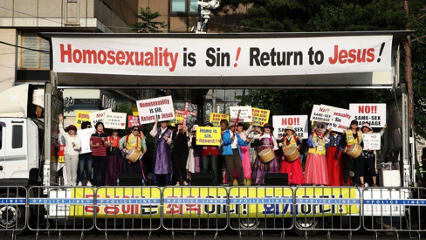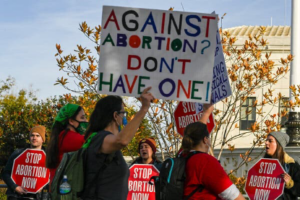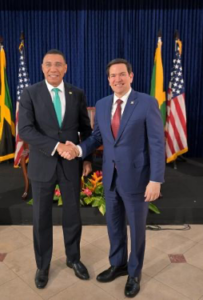By Joseph Buckland
It is a pattern of organisations that promote the LGBT agenda worldwide, such as the United Nations and the European Union, for example, to use words and phrases to communicate their agenda, but these words and phrases are vague and have some meanings in them, which all people would agree with; yet they have other meanings in them, which are unknown to us, convey the agenda, and may subconsciously influence our minds to eventually have a positive view of the agenda.
I have been studying this vague language for 15 years in speeches made by former president of the U.S.A., Barak Obama (2008–2016), and in various High School Curricula, such as The New Standards Religious Education Curriculum (November 2014–March 2015), Health and Family Life Education Curriculum (3rd Revised Edition, 2015), and in the trade agreement: African Caribbean Pacific-European Union Treaty (2022–present), and in various United Nations documents.
“Discrimination” means not only partial or unfair treatment; it also means letting opposite-sex couples have the right to get married but not giving the same right to same-sex couples to get married or not wanting the same right to be given to same-sex couples to get married. However, this is not really discrimination. Marriage and sexual relations were instituted by God for the reproduction of new human life and the training of this new human life to be godly. (Gen.1:28; Mal.2:15)
“Diversity” not only means different ethnic groups, or different languages, or different preferences for different kinds of meals, or different people with different abilities or different disabilities; but it means people who are different in their sexual preferences and expressions from the majority of people, such as same-sex couples.
“Equality” or “Comprehensive Equality” means not just fair treatment towards all people but specifically giving same-sex couples the same rights as are given to opposite-sex couples. This includes the right to marry, to have sex, and to bring up children. However, “Equality” or “Comprehensive Equality” is not applicable to marriage and sexual relationships, for God instituted marriage and sexual relations for the purposes of reproducing new human life and for the purpose of training this new human life to be godly. (See Gen.1:28; Mal.2:15)
“Gender” does not mean only “male” and “female”, as the Holy Scriptures teach; but there is the gender, which an individual prefers and chooses to be, other than his or her biological gender, called “gender-identity”; there is the concept of “trans-gender”, that is, as a result of choosing a different gender from one’s own natural gender, a person acts as if he or she is a different gender from their own natural gender, or they have surgery done and or hormonal treatment done, so that they may look and feel like the gender, which they identify with and prefer.
“Sexual Reproductive Health And Rights” means the right of a female to an abortion by a qualified medical practitioner, and it means the right for same-sex couples to have sex or to get married, as opposite-sex couples already have such a right. However, God does not approve of abortion, for it is shedding innocent blood (See Prov.6:17); it is taking the life of an unborn child, who has been created by God in His Image and Likeness (See Gen.9:6), and God has a plan for an unborn child’s life (See Jer.1:4-5).
“Homophobia” means “an irrational fear of or an aversion to homosexuality”. “Irrational” is a medical term that means that a person who fears or has an aversion to homosexuality is alleged to have a “mental illness”. However, “homophobia” is a deceptive word, for we do not have a mental illness for opposing homosexuality. We oppose it because God has restricted sexual relations to the marriage relationship of one man and one woman. (1st Cor.6:18-20; 7:2)
“Human Rights” are not only rights to life, liberty, education, medical attention, beliefs, and joining an organisation, for example, but also include people of “different gender identities and sexual orientations” having the “right to love and sexual expression” (Restorative Justice Training Module # 8: “Clientelle Diversity”, Slides 22 and 23). It includes “girls’ and boys’ rights and needs…and that the government works to improve the protection of children and their participation in decisions that concern them” (ACP-EU Treaty, Article 35, “Youth”, Subsection 2, page 62).
“Respect” is not only looking up to someone who has done something good in God’s sight, but, according to the Health and Family Life Education Curriculum, 3rd Revised Edition, 2015, it also includes accepting homosexuality, bisexuality, or transgender relationships as a “normal characteristic of relationships” (page 50) and not giving “harsh criticisms” (page 61) for these different sexual expressions.
“Sexual Minorities” means that a relatively small number of people in any society engage in lesbianism, homosexuality, or transgender relationships and have a different gender identity from their natural gender. Most people are in opposite-sex relationships. Therefore, “sexual minorities” refer to those who are in same-sex relationships.
“Sexual Rights” means not only the right to have sexual relations but specifically the authority and entitlement for people who are attracted to the same sex to have sexual relations with the same sex, or to have sexual relations with anyone or with anything. However, God has restricted sexual relations to the marriage relationship of one man and one woman. (1st Cor.7:2; Heb.13:4). Nobody has the “right” to do anything which God has commanded them not to do. (See Acts 5:29)
“Sexual Health Commodities” means condoms, which may prevent a person, who engages in sexual relations, from getting a sexually transmitted infection, or from getting HIV or A.I.D.S., and it is therefore called “Sexual Health Commodities”. The Comprehensive Sexuality Education, proposed by UNESCO Technical Guide On Sexuality Education, says that “sexual health commodities” should be made available to students in school. However, condoms does not make fornication acceptable to God. (1st Cor.6:18; 7:2)
“Tolerance” does not only mean “putting up with” or “bearing with”, which is the meaning of the Greek word “anechomai”, in the New Testament Scriptures, but in common usage in the European Union, the U.K., Canada, and the U.S.A., it means accepting lesbianism, homosexuality, bisexuality, transgender relationships, and different gender identities as a “right”. “Advocacy of tolerance is a key precursor to creating an environment for the protection of the human rights of persons with different gender identities and sexual orientation”. (Restorative Justice Facilitator Training Module 8: “Clientelle Diversity”, Slide 23) The opposite of “tolerance” is “intolerance”. “Religious teachings and a ‘fear of God’ are strong and foster…intolerances.” (Restorative Justice Facilitator Training, Module 8: “Clientelle Diversity”, Slide 24).
Be very careful how you interpret LGBT promotional materials, for it might sound reasonable and fair, since they emphasize the equal and fair treatment of all; but they misuse words and phrases to make the reader or the listener think that certain persons, because they are in the “minority” or because they are “different”, are being deprived of their “human rights”, when God has not given anyone, whether they are in the majority” or in the “minority”, or whether they are the same or “different”, the “human rights” to do anything that goes against His commandments or laws in the Holy Scriptures.






